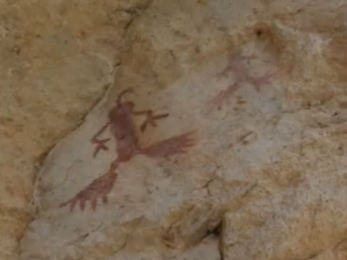By Melanie Zuercher
 On my desk is Pilgrims on the Silk Road: A Christian-Muslim Encounter in Khiva by Walter R. Ratliff, published by Wipf and Stock, 2010, 293 pages, $34.
On my desk is Pilgrims on the Silk Road: A Christian-Muslim Encounter in Khiva by Walter R. Ratliff, published by Wipf and Stock, 2010, 293 pages, $34.That book is Pilgrims on the Silk Road. It was preceded by a 2008 documentary film co-produced by Jesse Nathan, Through the Desert Goes Our Journey
What the experience of those who took the Great Trek retrace reveals, and what both Through the Desert and Pilgrims confirm, is that the story of Claas Epp, the eastward Mennonite migration and the people who made it is far more complex than Mennonite popular history outlines.
While Epp remains an enigma, Pilgrims on the Silk Road puts the motivation of the families leaving their prosperous and established Russian colonies to venture into the desert into a solid historical context.
It becomes clear, first of all, through Ratliff’s description of leaders such as J.K. Penner, Emil Riesen and Herman Jantzen, that these were educated, well-read people, far from a homogeneous bunch who took everything Epp said without question.
But perhaps even more important is the depiction of the respect and cooperation between Muslim and Mennonite communities. The Muslim village of Serabulak allowed several Mennonite families — forced out of a settlement in the khanate of Bukhara — to spend the winter there and even to use the mosque for their Sunday services.
When the Mennonites finally found a “permanent” home at Ak Metchet (until the Stalinist government collectivization in the mid-1930s), they coexisted peacefully for the most part with their Muslim neighbors. The Uzbek descendants of those neighbors who live and farm near the village site today remember nothing of millennial prophecies or strange theologies but only a thriving community of skilled craftsmen and expert farmers, friendly people devoted to peace.
An epilogue speaks of a healing of memory, of sorts, for Great Trek descendants from the United States who grew up with a sense of shame about “fanatics” in their ancestry.
Ratliff quotes Juhnke: “Our study and observations before, during and after the tour convinced us that the traditional narrative of the Great Trek is misleading in some key respects. I came to realize that I had not been doing a very good job of teaching this topic in Mennonite history classes at Bethel College over the past quarter century. Ironically, the village of Ak Metchet, scorned as it often was by other Mennonites, today is remembered and celebrated in Khiva more enthusiastically than larger settlements elsewhere.”
Pilgrims on the Silk Road fills in with rich detail the fascinating story that Through the Desert Goes Our Journey began.
Melanie Zuercher is the writer and editor for institutional communications at Bethel College in North Newton, Kan.




1 comment for “Book review published in Mennonite Weekly Review”